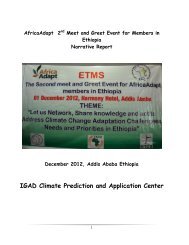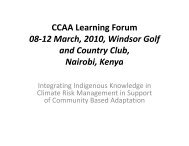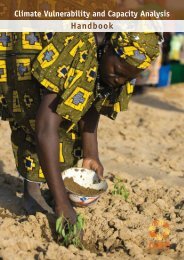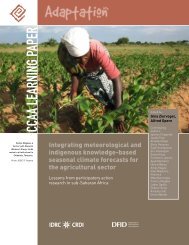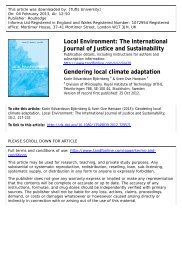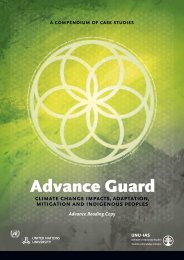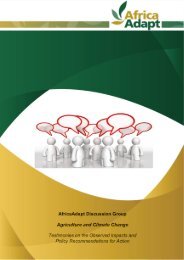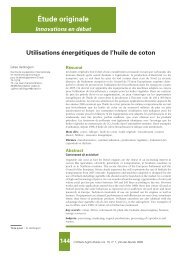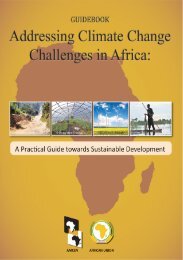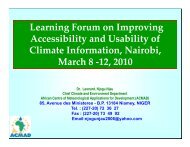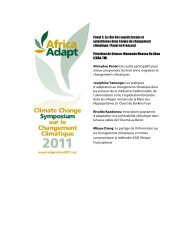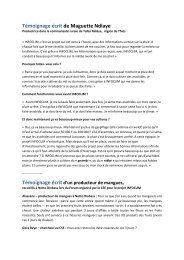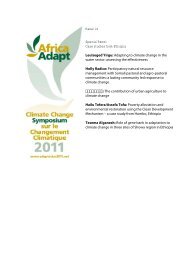Joto Afrika - Arid Lands Information Network
Joto Afrika - Arid Lands Information Network
Joto Afrika - Arid Lands Information Network
You also want an ePaper? Increase the reach of your titles
YUMPU automatically turns print PDFs into web optimized ePapers that Google loves.
Issue 6 March 2011<br />
CONTENTS<br />
Women as key players in climate<br />
adaptation 1<br />
Including women in adaptation processes 2<br />
Women adapt in southern Togo 3<br />
Cameroonian women take the lead in<br />
climate change adaptation 4<br />
How gender affects vulnerability to climate<br />
change in rural Namibia 5<br />
Changing gender roles due to climate<br />
change in northern Kenya 6<br />
Letters to the editor 7<br />
Tackling climate change ward by ward 8<br />
About <strong>Joto</strong> <strong>Afrika</strong><br />
<strong>Joto</strong> <strong>Afrika</strong> is a series of printed briefings<br />
and online resources about adapting to<br />
climate change in sub-Saharan Africa. The<br />
series help people understand the issues,<br />
constraints and opportunities that poor people<br />
face in adapting to climate change and<br />
escaping poverty.<br />
<strong>Joto</strong> <strong>Afrika</strong> is Swahili; it can be loosely<br />
translated to mean ‘Africa is feeling the heat’.<br />
Future issues will focus on climate change<br />
and pastoralism and climate change and<br />
energy. Please tell us what you think about<br />
this sixth issue of <strong>Joto</strong> <strong>Afrika</strong> and what you<br />
would like to read in the future issues –<br />
contact details are on page 8.<br />
Women harvesting grass to sell during drought<br />
periods, Kyuso, eastern Kenya<br />
© Noah Lusaka, ALIN 2009<br />
jotoafrika<br />
adapting to climate<br />
change in Africa<br />
Women as key players in<br />
climate adaptation<br />
Editorial<br />
Global debates identify the need to<br />
mainstream gender into climate change<br />
analysis, in relation to risk analysis,<br />
perceptions of vulnerability, experiences and<br />
coping mechanisms. The justification for this<br />
is that gender often dictates who gains and<br />
who loses in environmental disasters.<br />
A London School of Economics study of<br />
disasters in 141 countries shows that gender<br />
differences in deaths from natural disasters are<br />
directly linked to women’s economic and social<br />
rights. Where women lack basic rights, more will<br />
die from natural disasters than men; where they<br />
enjoy equal rights, the death rate is the same.<br />
Further statistics reveal the real issues around<br />
gender and climate change adaptation. Women<br />
provide up to 90 percent of rural poor people’s<br />
food and produce 60-80 percent of the food<br />
in most developing coun tries. But women<br />
are insufficiently represented in decisionmaking<br />
processes on climate change, for<br />
example community adaptation and mitigation<br />
strategies. Women must be included, because<br />
they can contribute different perspectives and<br />
experiences.<br />
Local knowledge<br />
Women are the best managers of natural<br />
resources because of their closeness to and<br />
high dependence on natural capital. Their local<br />
knowledge systems are important for climate<br />
adaptation. For example, women can initiate<br />
adaptive water management since they know<br />
the water sources and can negotiate with<br />
neighbours for water. And information sharing<br />
and networking among women’s groups are<br />
leading pathways in adaptation.<br />
This issue of <strong>Joto</strong> <strong>Afrika</strong> provides case studies<br />
of local knowledge in action across Africa, and<br />
success stories from research to showcase<br />
how gender analysis and representation are<br />
involved in climate adaptation. Drawing from<br />
these, there are several implications for climate<br />
adaptation in Africa.<br />
Work with women. Women’s organisations<br />
have information, knowledge, experiences,<br />
networks and resources that are vital<br />
to increasing resilience in the face of<br />
disasters. It is imperative to work with and<br />
build the capacities of existing women’s<br />
groups.<br />
Invest in effective communications,<br />
both in research and policy. Women<br />
are powerful agents of change and their<br />
leadership is critical. They can help or<br />
hinder progress on issues such as energy<br />
consumption, deforestation and the burning<br />
of vegeta tion, among many others.<br />
Think big. Gender equality and the principles<br />
of risk reduction must guide all efforts to<br />
mitigate disasters and respond to them.<br />
Know the facts. Vulnerability to climaterelated<br />
risks are not always the same for<br />
men and women in any population. Gender<br />
analysis is imperative to develop and<br />
deploy responsive adaptation strategies<br />
that are are fair to women and men.<br />
Resist stereotypes. Base all initiatives on<br />
knowledge of the specific local contexts<br />
and differences of each culture, their<br />
economic situation, and politics and gender,<br />
not on generalisations.<br />
Use a human rights approach.<br />
Democratic and participatory initiatives<br />
help women and girls more. Both men and<br />
women have a right to the conditions they<br />
need to enjoy their fundamental human<br />
rights, as well as simply to survive.<br />
Avoid overburdening women. They<br />
already have a heavy workload and many<br />
family responsibilities.<br />
Provide equal financing. Funds for<br />
adaptation, such as the World Bank’s<br />
Community Development Carbon Fund,<br />
should ensure that gender considerations<br />
are taken into account and that the initiatives<br />
implemented meet women’s needs.<br />
Grace Adeniji<br />
Department of Environmental Management,<br />
Lead City University, Ibadan, Nigeria<br />
Tel +234 8052163358<br />
oreofeadeniji@yahoo.com<br />
Gender not sex<br />
Gender refers to the differences in socially<br />
constructed roles and opportunities associated<br />
with being a man or a woman, including the<br />
interactions and social relations between men<br />
and women. Socio-cultural structures and factors<br />
in most indigenous African societies mean<br />
women are often more vulnerable than men to<br />
climate risks.<br />
See also<br />
The Gendered Nature of Natural Disasters: The<br />
Impact of Catastrophic Events on the Gender<br />
Gap in Life Expectancy, 1981–2002 by E.<br />
Neumayer and T. Pluemper, T. 2007<br />
http://bit.ly/dQkuvs
Workshop participants performing a role play to express<br />
gender relations with respect to climate change, South Africa<br />
© Indigo Development & Change, 2010<br />
Climate change can exacerbate<br />
inequalities. Because of their position<br />
in many societies, women tend to be<br />
more vulnerable to climate variability<br />
and change, and often experience larger<br />
negative impacts than men. Adaptation<br />
strategies should not consolidate or<br />
extend these inequalities.<br />
One way to ensure this is to enable women’s<br />
participation in all learning and decisionmaking<br />
related to climate adaptation, at all<br />
levels. But including women in a meaningful<br />
way is not easy. Women tend to provide<br />
the continuity in society; they stay at home<br />
to attend to children, and elderly and ill<br />
relatives. There may be livestock to attend<br />
to and food to prepare. In contrast, men are<br />
usually more mobile and often have more<br />
wide-ranging networks.<br />
Climate change preparedness<br />
For the past six years, Indigo Development<br />
& Change, a South African nongovernmental<br />
organisation, has facilitated<br />
climate change preparedness workshops<br />
every three months in the Suid Bokkeveld, a<br />
remote, semi-arid area in South Africa.<br />
The workshops were triggered by a very<br />
severe drought that lasted three years, and<br />
have evolved from a small group of mostly<br />
male farmers into rich quarterly community<br />
gatherings. Topics discussed include<br />
seasonal weather forecasts, results from<br />
farmers’ climate dairies, and strategies to deal<br />
with extreme climatic conditions and climate<br />
variability.<br />
Page 2<br />
Including women<br />
in adaptation<br />
processes<br />
Case study<br />
Facilitators planned carefully to ensure<br />
spaces to allow women and men full<br />
participation in the workshops. However,<br />
only a few women attended the first<br />
workshop and several brought their children<br />
with them. The children’s needs took the<br />
women’s focus off the workshop content, as<br />
did their attention to catering.<br />
At the women’s suggestion, the children<br />
were invited to engage in their own<br />
activities, run by two facilitators. The<br />
children enjoyed this and it has become<br />
a regular feature. The report from the<br />
children’s workshop is a highlight of each<br />
workshop! Catering is now provided by<br />
community members not engaged in<br />
farming. Furthermore, a bus collects all<br />
participants at convenient pick-up points, so<br />
everyone is equally mobile.<br />
The workshops provide an invaluable<br />
opportunity to understand the perspectives<br />
of women farmers in the area. They create<br />
a space for joint learning and reflection in<br />
the community, where men and women<br />
can share their experiences, collect<br />
information from small-scale experiments<br />
and climate monitoring, and plan strategies<br />
in anticipation of climate variability.<br />
Men and women propose small adaptation<br />
projects on their farms at workshops as<br />
well. This is a great confidence booster<br />
for some women, who report back on<br />
successes and challenges encountered.<br />
The equal access of men and women to<br />
funding for adaptation projects is important<br />
and supports an approach that includes<br />
the entire community and draws on the<br />
strengths of its members.<br />
Join the AfricaAdapt network<br />
These changes to the workshops have had<br />
several positive impacts:<br />
The children’s workshops and catering<br />
provided allow both female and male<br />
farmers to focus on the workshop<br />
content while having their needs, such<br />
as food and child care, attended to.<br />
The workshops perform an important<br />
social function and provide a safe<br />
space for interaction and sharing<br />
among women, who are often isolated<br />
on their farms.<br />
Women who want to play a larger role<br />
and be involved in the farmers’<br />
co-operative have been able to<br />
establish themselves as voices of<br />
authority.<br />
Women can enjoy the process of<br />
building self-confidence and having<br />
their contributions taken seriously<br />
in an engaging and enthusiastic<br />
environment.<br />
Wendy Annecke and Bettina Koelle<br />
Indigo Development & Change<br />
P.O. Box 154, Nieuwoudtville 8180, South<br />
Africa<br />
Tel +27 27 2181148<br />
bettina@indigo-dc.org<br />
See also<br />
Gender and Climate Change Adaptation,<br />
by Wendy Annecke, Indigo Development<br />
& Change, South Africa, 2010<br />
http://bit.ly/fQvpGV<br />
AfricaAdapt is an independent network in French and English, focused exclusively<br />
on Africa. The aim is to facilitate the flow of climate change adaptation knowledge<br />
for sustainable livelihoods between researchers, policymakers, civil society<br />
organisations and communities who are vulnerable to climate variability and<br />
change across the continent.<br />
www.africa-adapt.net<br />
info@africa-adapt.net
Women from the Gbénondou group undertake training on the selection of<br />
certified seeds in Davié Tékpo, southern Togo © AFHON 2009<br />
Women have been absent from debates<br />
on climate change for a long time,<br />
because men did not ask for or consider<br />
their views. However, women can and do<br />
contribute to innovative solutions to the<br />
problems caused by climate change.<br />
One example is the Gbénondou (meaning<br />
‘one voice’) group in Togo, composed<br />
of both women and men. To provide<br />
information about climate risks and to seek<br />
possible adaptation options, the Actions<br />
en Faveur de l’Homme et de la Nature<br />
(AFHON) association undertook a pilot<br />
project to support the Gbénondou group.<br />
The project aims to help members to<br />
develop reliable agricultural techniques to<br />
deal with the challenges caused by climate<br />
change. Women are particularly targeted<br />
by the project, because they have until<br />
now always been left out during training<br />
programmes.<br />
Challenges<br />
The women in the group farm in Davié Tékpo<br />
village in southern Togo. They acquired the<br />
land through leasing, since they do not own<br />
land. In addition to the common problems of<br />
farming in poor areas (such as low technical<br />
capacity, little equipment, and difficulties with<br />
land availability and access), critical weather<br />
variability has had major effects on the local<br />
community.<br />
A major issue is the irregularity of rainfall.<br />
This contributes to the degradation and<br />
loss of farmland, and soil erosion increases<br />
during periods of intense rainfall. Other<br />
climate-related problems include<br />
increased exposure of crops to pests<br />
and diseases and a decline in the<br />
resilience of seeds to extreme weather.<br />
Women are actively involved in<br />
agriculture in the village, which is their<br />
only source of income. Men are generally<br />
tradesmen involved in carpentry, public<br />
service, transport and masonry. Women<br />
sell products from the fields, so if climate<br />
change affects their crops, their business<br />
is also affected. Thus, women are more<br />
vulnerable to climate vulnerability.<br />
Women adapt<br />
in southern<br />
Togo<br />
Case study<br />
Field schools<br />
An AFHON technical team, with the support<br />
of Institut de Conseil et d’Appui Technique,<br />
a national institute specialised in providing<br />
advice and technical support in agronomy,<br />
organised field schools and demonstration<br />
units. Women were trained in the<br />
production and provision of certified seeds<br />
and taught about agricultural diversification<br />
options, such as breeding animals. These<br />
have had many successful outcomes, all of<br />
which have improved the living standards<br />
of group members.<br />
After attending the field schools, most<br />
women agreed to adopt new innovative<br />
techniques.<br />
Each family has increased its cropland<br />
area by 2 or 3 hectares.<br />
Output per unit of land has improved<br />
from 1.5 to 3.5 tons per hectare.<br />
The success of this initiative demonstrates<br />
how women are important and must<br />
be included in the solutions to climate<br />
change. The project also highlights several<br />
adaptation measures that other farming<br />
groups in the region could adopt:<br />
rotate crops to effectively fight against<br />
crop pests and the degradation of arable<br />
land<br />
adapt planting seasons and crops to<br />
rainfall patterns by establishing strong<br />
hedgerows and windbreaks; this<br />
protects farmland against<br />
water erosion in heavy rains and also<br />
wind erosion<br />
introduce species such as Leucena<br />
lococephala, Samanea samane,<br />
Mucouna and Caezalpinia pulcherima;<br />
these capture atmospheric nitrogen and<br />
convert it into a form of nitrogen that<br />
other crops can take up.<br />
Kokou Mawunya Guidigan<br />
Actions en faveur de l’Homme et de la<br />
Nature (AFHON), 08 BP 81 555, Lomé,<br />
Togo<br />
Tel + 228 9298528<br />
afhon.coordination@gmail.com<br />
Sandra Akpene Freitas<br />
Global advocacy associate<br />
Women's Environment & Development<br />
Organization (WEDO)<br />
Tel +212 9730325<br />
cendrillon_a@yahoo.fr<br />
See also<br />
Q&A: "Incomprehensible" Absence of<br />
Women in Global Environment Policy,<br />
Terraviva Online, 2010<br />
http://bit.ly/fSMRTN<br />
Gbénondou group pilot project<br />
http://bit.ly/hKC63J<br />
Join the <strong>Joto</strong> <strong>Afrika</strong><br />
debate online<br />
<strong>Joto</strong> <strong>Afrika</strong> Eldis Community Group:<br />
http://bit.ly/bM3ESo<br />
<strong>Joto</strong> <strong>Afrika</strong> Facebook Group:<br />
http://bit.ly/aMNLth<br />
Page 3
Gilbert Njodzeka, Green Care coordinator © Green<br />
Care Shisong, Cameroon, 2011<br />
In <strong>Joto</strong> <strong>Afrika</strong> 2, we read how Green<br />
Care, an environmental organisation in<br />
Bui Division of north-west Cameroon,<br />
organised reforestation projects with<br />
local villages to conserve water. In these<br />
projects, communities work together<br />
to plant local species around water<br />
catchments and springs. Women, who<br />
are responsible for collecting water in<br />
each community, are a key part of these<br />
projects. We got in touch with Gilbert<br />
Njodzeka, Green Care's coordinator, to<br />
find out more…<br />
Gilbert, you told us that women<br />
participate in sensitisation meetings<br />
and tree planting activities. Can you tell<br />
us how women are involved in these<br />
activities?<br />
In each community water catchment project,<br />
women are members of the managing<br />
committee. We (Green Care) have been<br />
working with these women to influence<br />
communities to turn out for work. These<br />
women educate fellow women in their<br />
many local groups about the importance<br />
of conserving existing trees and planting<br />
more water catchment-friendly trees. This<br />
is a fairly new approach within our area and<br />
women are at best at spreading information<br />
once they are convinced.<br />
Green Care insists on women being<br />
involved in community tree planting<br />
activities. Can you explain why?<br />
Green Care believes that women are the<br />
best channel to educate the community.<br />
Considering that our women are always in<br />
the farms, we realised that convincing them<br />
to plant trees and conserve existing ones<br />
is a big step to successful education of the<br />
community in conservation programmes.<br />
Because most of our tree planting<br />
programmes are around water catchment<br />
areas to help stabilise water sources, Green<br />
Page 4<br />
Cameroonian<br />
women take the<br />
lead in climate<br />
change adaptation<br />
Interview with Gilbert Njodzeka,<br />
Green Care coordinator<br />
Care focus on women’s involvement as<br />
they are the main users of water within<br />
our communities. Women draw water for<br />
household use, so Green Care knows the<br />
struggle they go through to carry water.<br />
Women facilitate the distribution of trees<br />
to be planted and are always there to sing<br />
motivating songs and provide food during<br />
community tree planting programmes.<br />
What roles do men play in the projects?<br />
How are these different to women, and<br />
why?<br />
Men load trees on and off trucks, at the<br />
nursery and the planting sites. They also<br />
clear and dig holes in planting sites. This<br />
is because men are considered fit for<br />
harder labour. Further, men are responsible<br />
for providing drinks during planting and<br />
planning tree planting days.<br />
Are women keen to get involved? If not,<br />
how do you encourage them to take<br />
part?<br />
Women are keen to get involved in the tree<br />
planting programmes but only when they<br />
are educated about the project input and<br />
outcome before the work day or project<br />
begins. Educating women is done during<br />
their many group meetings within the<br />
communities concerned.<br />
Do women benefit from the tree planting<br />
in terms of income?<br />
Women do benefit indirectly in that areas<br />
where trees are planted are always used<br />
as bee farming sites to raise income for the<br />
water management committees, who in turn<br />
use the income to maintain the water supply<br />
schemes. Also, some women are beginning<br />
to develop an interest in developing their<br />
individual bee keeping farms as a source<br />
of income by planting trees in carefully<br />
selected sites..<br />
Have you encountered any challenges<br />
to women being involved in your<br />
conservation projects?<br />
Our greatest challenge in getting women<br />
involved in conservation work is lack of<br />
motivation. Others include transporting<br />
women to project sites and difficulties in<br />
having enough awareness programmes about<br />
climate change and income generation.<br />
There is hardly enough money to pay for<br />
announcements over local community radios.<br />
What other challenges do the gender<br />
awareness aspects of your projects have?<br />
We still have difficulties convincing our<br />
youths about the importance of trees<br />
and the need to plant. Some men and<br />
youths are still talking negatively about<br />
tree planting as they try to discourage<br />
others, saying that trees take too<br />
long to be valuable. We still have too<br />
few demonstration sites to display to<br />
communities the value of tree planting in<br />
water catchment sites, so there is still some<br />
resistance and many questions about tree<br />
planting.<br />
What advice would you give to other<br />
community groups who are keen to<br />
encourage more women to get involved<br />
with environmental projects?<br />
Projects like this need to be handled by<br />
elected women leaders. There is also a<br />
need to educate these leaders carefully<br />
about the benefits before talking to other<br />
women. This is because women tend to<br />
respond to their leaders’ desires.<br />
There is also the need to exercise some<br />
patience in all conservation work.<br />
Gilbert Njodzeka<br />
P.O. Box 141 Kumbo, Bui Division, NW<br />
Province, Cameroon<br />
Tel + 237 77491127<br />
greencare@ymail.com<br />
gi702000@yahoo.com
Most women walk for long distances in search of firewood<br />
© e-iwm.wikispaces.com, 2003<br />
Vulnerability to climate change is<br />
complex. It is shaped by social,<br />
economic, ecological, institutional,<br />
technological and governance<br />
processes. Climate change also impacts<br />
on men and women in rural areas.<br />
As the climate changes, the exposures<br />
and risks people face also change.<br />
Experiences of current exposure to climaterelated<br />
hazards suggest women are more<br />
vulnerable than men. But historically, both<br />
men and women have particular social<br />
disadvantages that make them vulnerable<br />
to climate change.<br />
Research conducted in rural communities<br />
in Namibia shows that the different impacts<br />
experienced by men and women arise<br />
from the unequal distribution of roles and<br />
responsibilities. The research focused<br />
on two communities: Epyeshona village<br />
in northern-central Namibia and Daures<br />
Constituency in the north-western region.<br />
People in Namibia’s rural settings have<br />
strong links to the environment and climaterelated<br />
variables. The communities in<br />
Epyeshona that practice subsistence crop<br />
and livestock farming have a stronger link<br />
to the environment and are more affected<br />
Do you want to be a guest<br />
editor for <strong>Joto</strong> <strong>Afrika</strong>? Future<br />
issues will look at climate<br />
change and pastoralism, and<br />
climate change and energy.<br />
Send us your CV and cover letter –<br />
contact details are on page 8.<br />
by climate than those in Daures. An activity<br />
profile assessment revealed that women<br />
in this area interact with the environment<br />
more than men because they are expected<br />
to maintain household food security. They<br />
have to farm, go to the market, and fetch<br />
water and firewood.<br />
The environment in Daures is drier. The<br />
availability of rangelands for grazing is a<br />
key environmental variable in this area.<br />
Livestock rearing, the main source of<br />
livelihood, is mostly done by men hence<br />
they are comparatively more affected by<br />
effects of climate change.<br />
However, women lack technical skills to<br />
participate in formal employment and<br />
therefore engage more in informal economic<br />
activities such as collecting water and fuel<br />
wood. These are also negatively impacted<br />
by climate change. The environmental<br />
conditions in Daures do not offer many<br />
opportunities for women to participate<br />
beyond their household chores.<br />
Responses to climate change variability<br />
As the climate changes and affects<br />
livelihoods, men and women in the two<br />
communities are adapting in different ways<br />
because crop and livestock farming their<br />
main livelihoods are compromised.<br />
Women in Epyeshona village engage in<br />
basketry, processing of marula nuts and<br />
oil and selling chickens, pigs or goats.<br />
In Daures, farmers are starting to mine<br />
semi-precious stones on a small-scale<br />
basis. Women assist men by selling<br />
semi-precious stones to tourists.<br />
Recommendations<br />
There is a need to understand the historical<br />
and social disadvantages of both men and<br />
women, and how these affect their ability<br />
How gender<br />
affects<br />
vulnerability to<br />
climate change<br />
in rural Namibia<br />
Research summary<br />
to cope with current climate variability. This<br />
will impact on their ability to adapt and build<br />
resilience to climate change.<br />
Government officials and decisionmakers<br />
need to ensure that rural<br />
women are also involved in decisionmaking.<br />
This will lead to more<br />
successful programmes that enable<br />
rural communities to build resilience to<br />
adverse climatic conditions.<br />
Both men and women need support to<br />
empower them to excel in agriculture.<br />
They require appropriate labour-saving<br />
technology, seeds that can withstand<br />
different climatic conditions, and<br />
financial capital.<br />
People in Epyeshona village should<br />
diversify into more income-generating<br />
activities such as sewing, brick-making<br />
and selling crafts items.<br />
Margaret Angula<br />
Department of Geography and<br />
Environmental Studies, University of<br />
Namibia, Private Bag 13301, Windhoek,<br />
Namibia<br />
Tel +264 61 2063716<br />
mangula@unam.na<br />
margaret.angula@gmail.com<br />
This research project was supported by<br />
Heinrich Boll Foundation<br />
See also<br />
Gender and Climate Change: Namibia<br />
Case Study, Heinrich Böll Foundation<br />
Southern Africa, Margaret Angula, 2010<br />
http://bit.ly/hqGEb3<br />
Page 5
A male pastoralist fetches firewood in Mandera, Kenya<br />
© Ayub Macharia, 2009<br />
Climate change is not gender neutral;<br />
men and women in many communities<br />
interact with their physical environment<br />
in different ways. Vulnerability to the<br />
impacts of climate change also varies<br />
between men and women, for example in<br />
pastoral communities.<br />
Climate variability and change (such as<br />
higher temperatures and irregular rainfall)<br />
reduce pasture and water, leading to animal<br />
loss through hunger and disease. This has<br />
been worsened by climate-induced conflict<br />
resulting from resource competition among<br />
pastoralist groups of land users. The risk of<br />
conflict is significantly greater during times<br />
of stress, for example during drought or<br />
floods, when available resources are even<br />
more restricted.<br />
Men are particularly vulnerable to the<br />
direct risks from climate-induced conflicts<br />
over water, pasture and cattle. Among<br />
pastoralists, livestock are very important<br />
and a person’s social status is defined by<br />
the amount of livestock he has. When men<br />
lose their animals, they also lose their social<br />
status and decision-making power.<br />
Alternative livelihoods<br />
The loss of animals threatens the pastoral<br />
system. It creates hopelessness among<br />
pastoralist men and forces them to seek<br />
alternative livelihoods. Many have migrated<br />
to cities to look for jobs, but the majority<br />
do not have the right skills for professional<br />
jobs. Instead they end up working in lowpaid<br />
jobs like security guards. This has led<br />
to a decline in self-esteem and a feeling of<br />
hopelessness because of the loss of social<br />
Organisations and individuals in<br />
Africa can receive a free printed<br />
copy of the briefings. Each issue<br />
is also be available on the ALIN<br />
website (www.alin.net).<br />
Page 6<br />
Changing gender roles<br />
due to climate change<br />
in northern Kenya<br />
Case study<br />
status, from being a rich pastoralist and<br />
decision-maker within the community to<br />
doing manual jobs in cities.<br />
In pastoralist communities, marriage<br />
involves the payment of a dowry to the<br />
bride’s family. However, many men no<br />
longer have enough livestock for this and<br />
opt not to get married. This results in a<br />
breakdown in family structures and an<br />
increase in female-headed households.<br />
Female-headed households are vulnerable<br />
if they have no male members to herd<br />
livestock; the local culture limits their<br />
decision-making and ability to own assets.<br />
Men’s roles within the community are also<br />
changing. Traditionally, it was women’s<br />
role to collect water and firewood.<br />
However, during extreme droughts<br />
men are involved in fetching water and<br />
firewood, especially where the areas<br />
are prone to conflict. Men mostly use<br />
donkeys while the majority of women<br />
carry firewood and water on their heads<br />
or backs, so men tend to fetch firewood<br />
and water in greater quantities. This<br />
means that some can be used within the<br />
family and men can sell the rest.<br />
Recommendations<br />
It is important to recognise the gendered<br />
impact of climate change on pastoralists<br />
and strengthen their existing coping<br />
strategies. Possible responses include:<br />
Governments in countries with<br />
pastoralist communities must put in<br />
place security measures to protect<br />
pastoralists from cattle raiders.<br />
Subscribe to <strong>Joto</strong> <strong>Afrika</strong><br />
You can subscribe by sending an<br />
email to jotoafrica@alin.net. Please<br />
include your organisation and your<br />
full postal address. You can also<br />
subscribe and send feedback via<br />
SMS to +254 717 032322 and start<br />
with the word <strong>Joto</strong>.<br />
The movement of pastoralists in<br />
response to climate variability reduces<br />
pressure on pasture and water, both<br />
locally and internationally. This should<br />
involve inter-government agreements.<br />
The governments should develop early<br />
warning measures to predict droughts<br />
and inform pastoralist communities.<br />
The Kenyan government should buy<br />
animals before droughts to reduce<br />
animal loss and provide the pastoralists<br />
with money to restock their herds after<br />
droughts.<br />
Nancy A. Omolo<br />
Africa Climate Change Fellowship<br />
Programme, University of Kwa Zulu Natal,<br />
School of Environmental Sciences Faculty<br />
of Humanities, Development and Social<br />
Sciences, Durban, South Africa<br />
Tel +27 31 796311215; +254 722620478<br />
nancy.omolo@gmail.com<br />
This project was funded by International<br />
Development Research Centre (IDRC) and<br />
UK International Development Fund (DFID).<br />
See also<br />
‘Gender and climate change-induced<br />
conflict in pastoral communities: Case<br />
study of Turkana in northwestern<br />
Kenya’, by Nancy A. Omolo, pages 81-<br />
102 in African Journal on<br />
Conflict Resolution, Volume 10(2),<br />
2010<br />
http://bit.ly/edj3rg<br />
Future issues will focus on<br />
pastoralism and energy. Please tell<br />
us what you think about this sixth<br />
issue of <strong>Joto</strong> <strong>Afrika</strong> and what you<br />
would like to read in future issues –<br />
contact details are on page 8.
Letters to the editor<br />
We welcome your feedback on this sixth issue of <strong>Joto</strong> <strong>Afrika</strong>. Please send us your<br />
thoughts using the contact details on page 8. Please include your full contact address<br />
or email. A selection of letters will be printed in the next issue. Letters may be edited.<br />
Dear Editor,<br />
Thank you very much for <strong>Joto</strong> <strong>Afrika</strong> issues. Issue 4 on<br />
forestry was great! It is the core of what we do and we<br />
have used it to implement various projects. We have also<br />
shared <strong>Joto</strong> <strong>Afrika</strong> with different community-based groups,<br />
organisations and schools in Rift Valley, Kenya. We would<br />
also like to inform you that we got the innovation fund from<br />
AfricaAdapt that we read about in <strong>Joto</strong> <strong>Afrika</strong>! from the link<br />
provided, we visited the AfricaAdapt website and saw the call<br />
for innovation and applied.<br />
Long live <strong>Joto</strong> <strong>Afrika</strong>!<br />
Thomas Gichuru<br />
Tree is Life<br />
Kenya<br />
Editor: Thomas, It is great you find the newsletter<br />
useful. We are also happy that you got the<br />
innovation fund through our newsletter. We<br />
would like to get feedback from the groups you<br />
work with on what they think about <strong>Joto</strong> <strong>Afrika</strong> as<br />
well.<br />
Dear Editor,<br />
This newsletter looks very useful – compliments to the team<br />
on how they’ve managed to present one item on each page.<br />
Can I use it as a model when I do training courses?<br />
Paul Mundy<br />
Development communication specialist<br />
Germany<br />
Editor: Paul, we are pleased you like the<br />
newsletter, please go ahead and use it and ensure<br />
you acknowledge the source.<br />
Contribute to <strong>Joto</strong> <strong>Afrika</strong><br />
Do you want to tell people how your community is<br />
adapting to climate change? Are you involved in a<br />
programme, project or research that is helping people to<br />
find practical solutions to cope with the effects of climate<br />
change? We want your contributions for <strong>Joto</strong> <strong>Afrika</strong>!<br />
We are looking for research work, community case studies, videos,<br />
audio clips and photo essays about climate change adaptation across<br />
sub-Saharan Africa. The case studies need to be short (no more than<br />
600 words), easy to understand and provide practical information for other<br />
people facing these problems. We welcome contributions in French and<br />
English.<br />
If you would like to contribute, please contact the editor at jotoafrica@alin.net<br />
Dear Editor<br />
Thank you for the fourth issue of <strong>Joto</strong> <strong>Afrika</strong>. I am very<br />
interested in the effects of climate change and mitigation.<br />
Please continue briefing us more on agriculture, pastoralism,<br />
gender and human health.<br />
Eliud Msigwa<br />
Tanzania<br />
Editor: Eliud, I hope you have found this issue on<br />
gender useful. We plan to feature pastoralism in<br />
our next issue (June 2011), so please look out for<br />
that as well..<br />
Dear Editor,<br />
The publication is nice and I like the perspective (issue 5) has<br />
taken on malaria. I would have liked to read something too<br />
on the impact caused by the use of DDT in the control of the<br />
Anopheles mosquito and whether it is has any contribution<br />
towards the current climate change.<br />
Gerald Cosmas Yongo<br />
Kenya<br />
Editor: Thank you for the follow up question,<br />
please feel free to ask the author of the article for<br />
further information. Use the contacts below<br />
the article. We will also forward<br />
your question to him.<br />
Page 7
Women in Lindi, Tanzania, have to walk long<br />
distances to fetch water from caves<br />
© Yusuf Badi/British Council<br />
Climate change is impacting populations<br />
and ecosystems around the world, but<br />
people with the fewest resources are<br />
most susceptible – particularly women,<br />
the majority of the world’s poor.<br />
In most parts of Tanzania, women<br />
participate in crop and livestock production,<br />
and engage in off-farm activities to diversify<br />
the family income. They also provide food,<br />
water and fuel for their families and care for<br />
children, elderly people and the sick.<br />
Flora K. Munyasya, a student at the Institute<br />
of Rural Development Planning in Tanzania,<br />
conducted a survey in Bahi-sokoni village<br />
(Bahi District, Dodoma region). She looked<br />
at how households access their basic needs<br />
– fuel wood, water, food, education and<br />
health. The study showed that women and<br />
girls in the region contribute more than 70<br />
percent of a household’s time and efforts<br />
for domestic and farm activities (including<br />
land preparation, crop sowing, weeding and<br />
harvesting). The survey also found that:<br />
85 percent of all travel is done by<br />
women; 15 percent is by men and<br />
children.<br />
80 percent of all journeys are for<br />
transporting water and fire wood and<br />
travelling to the grinding mills.<br />
<strong>Joto</strong> <strong>Afrika</strong> is produced four times a year<br />
by ALIN in partnership with the Institute<br />
of Development Studies (IDS). The<br />
series is funded by the UK Department<br />
for International Development (DFID)<br />
through IDS Knowledge Services.<br />
Tackling climate<br />
change ward by ward<br />
Case study<br />
95 percent of this transportation is done<br />
by foot and head-loading.<br />
Climate change is affecting many of these<br />
activities. Previously, the area had reliable<br />
rains, and water and fuel wood were<br />
plentiful nearby. But recent severe droughts<br />
have caused many problems.<br />
The prolonged drought has led many<br />
people to abandon their traditional farming<br />
livelihood, of food crops and cattle breeding,<br />
to earn a living making charcoal and<br />
clay bricks. The felling of trees for these<br />
activities leaves women with even longer<br />
distances to walk in search of firewood,<br />
meaning yet more hours each day on the<br />
road, reducing their productive hours.<br />
Where there is family transport, for example<br />
a bicycle, men and boys dominate the use.<br />
Collecting water has also become more<br />
difficult. Some livestock keepers are<br />
reluctant to destock their animals and<br />
switch to alternative activities, since owning<br />
large herds is a sign of wealth. The lack<br />
of destocking causes overgrazing, which<br />
results in the destruction of possible water<br />
catchment areas. This, together with the<br />
long droughts, has caused a water shortage<br />
in the region. This has again left women<br />
with longer distances to collect water.<br />
Articles from <strong>Joto</strong> <strong>Afrika</strong> may be re-used,<br />
provided the materials are distributed<br />
free of charge and the author(s) are<br />
credited. Please send copies to ALIN.<br />
Views expressed in <strong>Joto</strong> <strong>Afrika</strong> do not<br />
necessarily reflect the views of the<br />
editors or ALIN, IDS and DFID.<br />
Guest Editor<br />
Grace Adeniji<br />
Department of Environmental<br />
Management, Lead City University,<br />
Ibadan, Nigeria<br />
Facing the effects<br />
Faced with these problems, the community<br />
decided to act. Members of Dodoma<br />
Environmental <strong>Network</strong>s (DONET) helped the<br />
community to form four Ward Environmental<br />
<strong>Network</strong>s. Each ward comprises two to five<br />
villages. To ensure effective coordination of<br />
the networks, the members formed the Bahi<br />
District Environmental <strong>Network</strong>.<br />
After identifying the predominant<br />
environmental problems in their ward,<br />
network members developed work plans<br />
to guide them in efforts to resolve these<br />
problems. Establishing and managing tree<br />
nurseries is the priority in each ward. The<br />
next step is tree planting around homesteads<br />
and establishing forests in reserved areas of<br />
each village. The network hopes that these<br />
efforts will gradually minimise the harmful<br />
effects of climate change in Bahi District.<br />
DONET is interested in exchanging<br />
experiences with other organisations and<br />
communities on counteracting the effects of<br />
climate change.<br />
Chitopela Amaundus<br />
Dodoma Environmental <strong>Network</strong>s, P.O. Box<br />
1414, Dodoma, Tanzania<br />
Tel +255 262324750<br />
donetdodoma@yahoo.com<br />
Chief Editor<br />
Esther Lung’ahi-ALIN<br />
Article adapted from the Dimitra newsletter<br />
Editorial Team<br />
James Nguo-ALIN<br />
Susan Mwangi-ALIN<br />
Anthony Mugo-ALIN<br />
Fatema Rajabali-IDS<br />
Freida M Cormack-IDS<br />
Consulting Editor<br />
Tim Woods<br />
<strong>Joto</strong> <strong>Afrika</strong><br />
<strong>Arid</strong> <strong>Lands</strong> <strong>Information</strong><br />
<strong>Network</strong><br />
P.O. BOX 10098-00100<br />
G.P.O.<br />
Nairobi, Kenya<br />
Tel +254 20 2731557<br />
Fax +254 20 2737813<br />
SMS +254 717032322<br />
Email jotoafrica@alin.net<br />
ISSN 2075-5562



